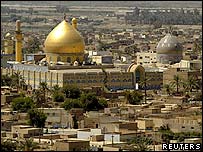You know what "stay the course" is?
Virtually anyone who holds elected office is terrified to publically acknowledge this war for what it is and must be. The only leadership shown by the administration is in its effort to suppress the true nature of this conflict and what it will require of us to win. We'll see who steps up after the election.
After reading dozens of opinions this week on Iraq, each of which chimed into one of three or four stock takes (none with an actual prescription) on the war, I read this report to WSJ from an Army sergeant in Iraq. It’s a nice, brutal little orientation to the situation.
*********************************************************************
BEST OF THE WEB TODAY
BY JAMES TARANTO
Wednesday, October 25, 2006 12:41 p.m. EDT
A View From Iraq
Our item yesterday in which we reaffirmed our support for the liberation of Iraq brought some very interesting reader comments. This is from an American there who asks not to be named:
There's been a lot of discussion back home about the course of the war, the righteousness of our involvement, the clarity of our execution, and what to do about the predicament in which we currently find ourselves. I just wanted to send you my firsthand account of what's happening here.
First, a little bit about me: I'm stationed slightly northwest of Baghdad in a mixed Sunni/Shia area. I'm a sergeant in the U.S. Army on a human intelligence collection team. I interact with Iraqis on a daily basis and I help put together the intel picture for our area of operations. I have contacts with friends, who are also in my job, in every area of operations in the Fourth Infantry Division footprint, and through our crosstalk I'd say I have a pretty damn good idea of what's going on in and around Baghdad on a micro and intermediary level.
I wrote heavily in favor of this war before I enlisted myself, and I still maintain that going into Iraq was not only the necessary thing to do, but the right thing to do as well.
There have been distinct failures of policy in Iraq. The vast majority of them fall under the category "failure to adapt." Basically U.S. policies have been several steps behind the changing conditions ever since we came into the country. I believe this is (in part) due to our plainly obvious desire to extricate ourselves from Iraq. I know President Bush is preaching "stay the course," but we came over here with a goal of handing over our battlespace to the Iraqis by the end of our tour here.
This breakneck pace with which we're trying to push the responsibility for governing and securing Iraq is irresponsible and suicidal. It's like throwing a brick on a house of cards and hoping it holds up. The Iraqi Security Forces (ISF)--a joint term referring to Iraqi army and Iraqi police--are so rife with corruption, insurgent sympathies and Shia militia members that they have zero effectiveness. Two Iraqi police brigades in Baghdad have been disbanded recently, and the general sentiment in our field is "Why stop there?" I can't tell you how many roadside bombs have been detonated against American forces within sight of ISF checkpoints. Faith in the Iraqi army is only slightly more justified than faith in the police--but even there, the problems of tribal loyalties, desertion, insufficient training, low morale and a failure to properly indoctrinate their soldiers results in a substandard, ineffective military. A lot of the problems are directly related to Arab culture, which traditionally doesn't see nepotism and graft as serious sins. Changing that is going to require a lot more than "benchmarks."
In Shia areas, the militias hold the real control of the city. They have infiltrated, co-opted or intimidated into submission the local police. They are expanding their territories, restricting freedom of movement for Sunnis, forcing mass migrations, spiking ethnic tensions, not to mention the murderous checkpoints, all while U.S. forces do . . . nothing.
For the first six months I was in country, sectarian violence was classified as an "Iraqi on Iraqi" crime. Division didn't want to hear about it. And, in a sense I can understand why. Because division realized that which the Iraqi people have come to realize: The American forces cannot protect them. We are too few in number and our mission is "stability and support." The problem is that there's nothing to give stability and support to. We hollowed out the Baathist regime, and we hastily set up this provisional government, thrusting political responsibility on a host of unknowns, each with his own political agenda, most funded by Iran, and we're seeing the results.
In Germany after World War II, we controlled our sector with approximately 500,000 troops, directly administering the area for 10 years while we rebuilt the country and rebuilt the social and political infrastructure needed to run it. In Iraq, we've got one-third that number of troops dealing with three times the population on a much faster timetable, and we're attempting to unify three distinct ethnic groups with no national interest and at least three outside influences (Saudi Arabian Wahhabists, Iranian mullahs and Syrian Baathists) each eagerly funding various groups in an attempt to see us fail. And we are.
If we continue on as is in Iraq, we will leave here (sooner or later) with a fractured state, a Rwanda-waiting-to-happen. "Stay the course" and refusing to admit that we're screwing things up is already killing a lot of people needlessly. Following through with such inane nonstrategy is going to be the death knell for hundreds of thousands of Sunnis.
We need to backtrack. We need to publicly admit we're backtracking. This is the opening battle of the ideological struggle of the 21st century. We cannot afford to lose it because of political inconveniences. Reassert direct administration, put 400,000 to 500,000 American troops on the ground, disband most of the current Iraqi police and retrain and reindoctrinate the Iraqi army until it becomes a military that's fighting for a nation, not simply some sect or faction. Reassure the Iraqi people that we're going to provide them security and then follow through. Disarm the nation: Sunnis, Shias, militia groups, everyone. Issue national ID cards to everyone and control the movement of the population.
If these three things are done, you can actually start the Iraqi economy again. Once people have a sense of security, they'll be able to leave their houses to go to work. Tell your American commanders that it's OK to pass up bad news--because part of the problem is that these issues are not reaching above the battalion or brigade level due to the can-do, make-it-happen culture indoctrinated into our U.S. officers. While the attitude is admirable, it also creates barriers to recognizing and dealing with on-the-ground realities.
James, there's a lot more to this than I've written here. The short of it is, the situation is salvageable, but not with "stay the course" and certainly not with cut and run. However, the commitment required to save it is something I doubt the American public is willing to swallow. I just don't see the current administration with the political capital remaining in order to properly motivate and convince the American public (or the West in general) of the necessity of these actions.
At the same time, failure in Iraq would be worse than a dozen Somalias, and would render us as impotent and emasculated as we were in the days after Vietnam. There is a global cultural-ideological struggle being waged, and abdication from Iraq is tantamount to concession.



